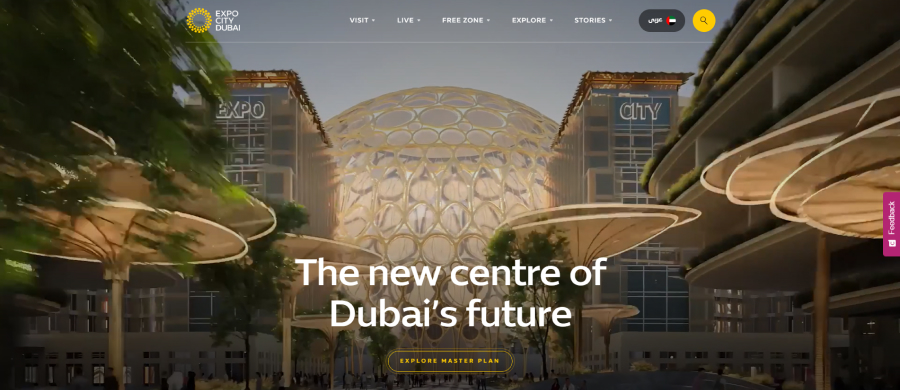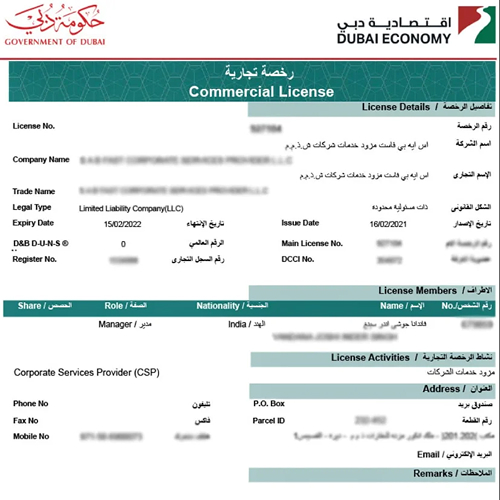If you followed Expo 2020, you already know the site wasn’t built just for six months of shows and exhibitions. The area has been transformed into Expo City Dubai, and part of that transformation is a free zone where businesses can set up and grow. It’s a newer name on the list of UAE free zones, but the advantage is obvious: everything here is modern, built recently, and designed with today’s entrepreneurs in mind.
Most people still think of Dubai’s big hitters like DMCC or DIFC when it comes to company formation. Those places are great but also pricey, with processes that can feel heavy if you just want a straightforward setup. Expo City Dubai Free Zone is more practical. It has the infrastructure of a brand-new city, but without the same level of cost or red tape.
The location helps too. You’re right next to Al Maktoum International Airport, on the Expo metro line, and a short drive to Jebel Ali Port. For a trading or logistics company, that’s gold. Even if you’re a consultant or digital entrepreneur, the accessibility makes life easier.
The other selling point is flexibility. You can start small — a single visa, a small desk — and add on later. For freelancers, startups, and global firms testing the UAE market, it’s a zone that grows with you.

Why Choose Expo City Dubai Free Zone for Business Setup?
About Expo City Dubai Free Zone
Expo City Dubai Free Zone is still a fresh name on the UAE’s free zone list, but that freshness is exactly what makes it interesting. Unlike older zones where processes were set up decades ago and have been patched together over time, Expo City was designed from scratch after Expo 2020 ended. The whole district was created to showcase innovation, green living, and international collaboration, and the free zone is built on that same foundation.
You’re not just getting office space or a trade license here. You’re stepping into a site that still carries global recognition. Governments, corporations, and innovators from all over the world left their footprint during the Expo, and the UAE has kept the area alive as a permanent city. That means ongoing events, international forums, and constant attention from the business community. For a company that wants to look modern, forward-thinking, or simply “different,” being based in Expo City sends that message.
Another advantage is that Expo City Dubai Free Zone is officially backed by the government. You’re not setting up shop in a small private zone that could disappear in a few years; you’re part of a long-term project tied to Dubai’s growth plan. Add to that the physical location — right inside Dubai South, minutes from Al Maktoum International Airport, connected by metro, and with easy access to Jebel Ali Port — and you’ve got a logistical sweet spot. For importers, exporters, or service companies that need to move fast, this location cuts headaches. For startups or consultants, it’s just as valuable: you can tell clients you’re based in a brand-new, globally recognized district.
In short, this free zone is about more than paperwork. It’s about positioning your business in a place that feels aligned with the future of Dubai.
Business Activities Allowed in Expo City Dubai Free Zone
One of the strengths of Expo City Dubai Free Zone is that it doesn’t lock itself into one narrow category. Some free zones in the UAE are very specialized — media only, education only, shipping only. Expo City goes broader. It allows a wide mix of activities, which makes it attractive for entrepreneurs who don’t want to feel boxed in.
Standard activities are well covered: trading, consulting, professional services, marketing, IT, e-commerce, and general business support. That covers most freelancers, small firms, and international investors who want a quick setup. The free zone also leans into the Expo legacy by welcoming green technology, sustainability projects, smart-city solutions, and innovation-driven startups. If your business has anything to do with renewable energy, urban tech, or social impact, this is one of the best addresses in Dubai to highlight that profile.
There are, of course, some activities that require extra approvals. Financial services, healthcare, and education normally involve clearance from UAE regulators, no matter which free zone you choose. But in general, the scope here is wide enough that you don’t need to worry about being stuck. You can set up as a consultant, then expand into trading, or start with an e-commerce license and later add other services.
For entrepreneurs who want both credibility and freedom, the range of allowed activities makes Expo City Dubai Free Zone practical. Whether you’re a solo consultant, a trading company, or a startup trying to raise capital, you’ll find a legal category that fits.
Step-by-Step Expo City Dubai Freezone Company Formation and Registration
Setting up a company in Expo City Dubai Free Zone isn’t complicated, but it does follow a clear process. Think of it as a checklist: choose your company structure, gather the paperwork, submit it to the authority, and wait for approval. Compared to older zones, the steps here are more streamlined, thanks to digital systems and remote verification options.
Company Forms Available
The first decision is which type of company you want to register. Expo City Dubai Free Zone gives you flexibility, and that’s important because not every entrepreneur is at the same stage.
- Free Zone Limited Liability Company (FZ-LLC) – This is the most common form. It’s a separate legal entity, meaning your personal liability is limited to your share in the company. It can have one or more shareholders, and those shareholders can be individuals or corporate entities. If you’re planning to grow, hire staff, and sign contracts, this is the structure most investors choose.
- Branch of a Foreign Company – If you already run a business outside the UAE and just want a presence in Dubai, a branch is the way to go. The branch doesn’t create a new company; it’s an extension of your existing one. That means no separate share capital requirements, but you’re tied to the parent company’s identity.
This range of options makes the free zone suitable for both small freelancers and global businesses. You can start as a freelancer and later upgrade to a full FZ-LLC without needing to move to another zone.
Required Documents and Timeline
Expo City Dubai Free Zone breaks the process into two clear stages: Initial Approval and Final Approval. This structure makes it easy to know what to prepare and when.
Initial Approval Documents
To get your initial approval, you’ll need to submit:
- ECDA Business Setup application form (official template).
- Signed lease offer letter (optional, provided by the free zone if you’ve already selected a workspace).
- Passport copies of all shareholders, directors, managers, and secretaries (if applicable).
- UAE visa copies of all licensed parties (if applicable).
- Emirates ID copies of all licensed parties (if applicable).
- Additional documents for controlled business activities (if your business involves sectors like food & beverage, shisha, alcohol, etc.).
- Parent company license (for branches).
- Brand ownership or franchise agreement (if you are opening a branded business or franchise).
- Specimen signature forms for all shareholders and the company manager (using ECDA templates).
Final Approval Documents
Once initial approval is granted, ECDA will request the final set of documents for license issuance:
- Articles of Association (signed, using ECDA’s template).
- Shareholder Resolution / Declaration to set up the new company (ECDA template).
- Approvals from government authorities for any controlled activities (if applicable).
- Ultimate Beneficial Owner (UBO) Declaration (ECDA template).
- Parent company license with at least six months’ validity (for branches).
- Good Legal Standing certificate (optional, but often requested for corporate shareholders).
- Incorporation certificates of the parent company (for branches).
- Shareholder Resolution / Declaration to open a branch and appoint a company manager (if you are opening a branch).
- Parent company Articles of Association (for branches).
Timeline
Expo City Dubai Free Zone is designed for speed. Initial approval is typically issued within a few working days of submitting the first set of documents. Final approval and license issuance follow shortly after — usually within five to ten working days once the second set is received and verified.

Want to learn more about UAE business setup services?
Remote Registration Option
One of the most attractive features of Expo City Dubai Free Zone is that you don’t have to fly to Dubai to get started. The free zone authority allows remote setup, meaning the whole process can be done online, with verification handled by video call.
Here’s how it usually works:
- You send the scanned documents electronically.
- The free zone schedules a short video call to verify your identity.
- Once confirmed, the authority processes your application, issues the trade license, and sends it digitally.
- Your corporate bank account can also be arranged remotely, with banks conducting their own video or phone verifications.
This system is especially useful for international investors who want to test the UAE market before committing to relocating. It’s also a lifesaver for freelancers and small startups who want to save on travel costs.
The result is that you can literally set up a UAE company from your living room abroad, and once you’re ready to expand, you can visit Dubai to arrange offices, hire staff, or apply for residence visas under your new company.
Types of Licenses and Costs in Expo City Dubai Freezone
Expo City Dubai Free Zone offers a full range of licenses to match different business activities. The official categories are:
Commercial Licence – For trading activities including import, export, buying, selling, and distributing items as per the selected industry groups.
General Trading Licence – Allows trading in multiple product categories under one license, ideal for companies dealing with a wide range of goods.
Service Licence – Covers service-oriented activities, including consultancy, hospitality, event management, training, and other professional services.
E-Commerce Licence – Specifically for online trading of products and services.
Logistics Licence – For transportation, distribution, warehousing, freight forwarding, and other supply chain services.
Holding Licence – For companies that hold assets or own subsidiaries without running daily operations.
Industrial Licence – For light manufacturing, assembly, and packaging activities.

Commercial Licence
This structure lets businesses pick exactly what they need without being locked into a single model. Start with one license, and if your activities expand, you can add more categories later.
Visa Packages and Pricing
Expo City Dubai Free Zone publishes clear starting fees so investors know what to expect.
- Registration & Licensing Fees: Starting from AED 15,000, depending on your chosen business activity and license duration.
- Application Fee: AED 500 (non-refundable).
- Company Card: AED 2,100 (if applicable).
- Customisation Costs: Tailored quotes are available if you need shell & core, semi-fitted, or fully branded office spaces.
Workspace options range from flexi-desks and shared coworking areas to private offices and customised units. Costs scale with the size and type of space selected.
Visa quotas are allocated based on your chosen facility. Rather than fixed “one-visa” or “two-visa” packages, the free zone confirms the number of visas you can obtain once your license and workspace are finalised. This gives businesses flexibility to start small and expand later as their team grows.
Expo City Dubai Free Zone Corporate Tax, VAT, and Duties
One of the reasons investors look at UAE free zones is the tax angle. For years, the UAE was known as a zero-tax jurisdiction. That changed in 2023, when the government rolled out a federal corporate tax of 9% on business profits above AED 375,000. The law applies across the country, including free zones — but with an important catch.
Companies set up in “Qualifying Free Zones,” which include Expo City Dubai Free Zone, can still benefit from a 0% corporate tax rate on qualifying income. What counts as “qualifying” depends on the activity and where the income comes from. For example, trade with businesses outside the UAE or between free zones usually qualifies. Deals with the UAE mainland may trigger the 9% rate. It’s not automatic, and companies have to meet certain substance and compliance requirements to keep the 0% status.
VAT is separate. The UAE has a 5% value-added tax, and Expo City companies are not exempt. If your business turnover crosses the registration threshold (currently AED 375,000 annually), you must register for VAT, file returns, and charge VAT where applicable. If you’re under that threshold, it’s optional — but many firms still register so they can reclaim VAT on expenses.
On customs duties, the rule is straightforward: goods that stay inside the free zone or are re-exported abroad are usually exempt from import duties. The moment you bring them into the UAE mainland, normal customs apply (typically 5%). That’s one reason why trading companies like free zones; they can hold stock duty-free until it’s sold into the local market.
For businesses in Expo City Dubai Free Zone, the combination is clear: potential 0% corporate tax (if you qualify), 5% VAT obligations once you cross the threshold, and customs duty exemptions as long as goods don’t enter the mainland. It’s attractive, but it also means you need proper bookkeeping and tax compliance.
Expo City Dubai Free Zone Company Formation: Who Should (and Shouldn’t) Choose This Free Zone?
Expo City Free Zone isn’t a one-size-fits-all solution. For some, it works beautifully. For others, not so much.
If you’re a freelancer, consultant, or small digital outfit, it’s a solid choice. The freelance permit is cheap compared to bigger zones, and you can start with just a desk and one visa. That’s enough to get a legal presence in Dubai without burning through savings. Startups chasing credibility also like the “Expo City” tag on their paperwork — it still echoes the Expo 2020 vibe of innovation and sustainability.
Traders and logistics firms see value too. You’re sitting next to Al Maktoum Airport and within easy reach of Jebel Ali Port. That’s basically gold if you’re moving goods in and out. Plus, as long as your products stay in the zone or get re-exported, customs duties don’t apply.
Who’s it not for? Businesses that mainly serve the UAE mainland. The minute you’re dealing with local clients, the 9% corporate tax kicks in, and sometimes you need extra approvals. Also, heavy industries and sensitive sectors like finance or healthcare might find more suitable zones elsewhere.
So, lean operations, traders, green-tech, and digital guys? Good fit. Heavy manufacturing or mainland-only sales? Look elsewhere.

Conclusion
Expo City Dubai Free Zone is new, but that’s part of its appeal. Everything was built recently, so the systems are digital, the infrastructure is modern, and the whole project is tied to the Expo 2020 legacy. For many small firms and entrepreneurs, that’s enough to make it stand out from the older zones.
The strengths are clear: flexible licenses, options for freelancers as well as bigger setups, strong transport links through Dubai South, and the ability to register remotely without flying in. Add in the tax advantages — possible 0% corporate tax on qualifying income and duty-free storage inside the zone — and you’ve got a package that works for traders, consultants, and startups trying to test the UAE market.
It isn’t perfect. Heavy industries and companies that only serve the UAE mainland may find the benefits watered down. But for lean, international, or digital-first businesses, it’s a practical and future-focused base.
Need a hand setting up? Our team at Consulting.ae helps businesses get licensed, stay compliant, and choose the right package. Reach out today, and we’ll walk you through the process step by step.
Yes, you can. Everything’s digital now. You send scanned documents, jump on a quick video call for ID checks, and that’s it — the license shows up in your inbox. No need to fly in just for paperwork.
Sometimes. The free zone itself usually takes full payment, but certain agents or service providers break it down into parts. Worth asking before you sign — it depends on who processes your setup.
Yes. Free zones were built for exactly that — imports, exports, re-exports. As long as goods don’t cross into the UAE mainland, you avoid local customs duties. The moment they enter the domestic market, normal charges apply.
Most don’t. Trading, services, e-commerce — all fine. But finance, healthcare, and education usually need an external green light from regulators. That’s standard across the UAE, not just Expo City.
